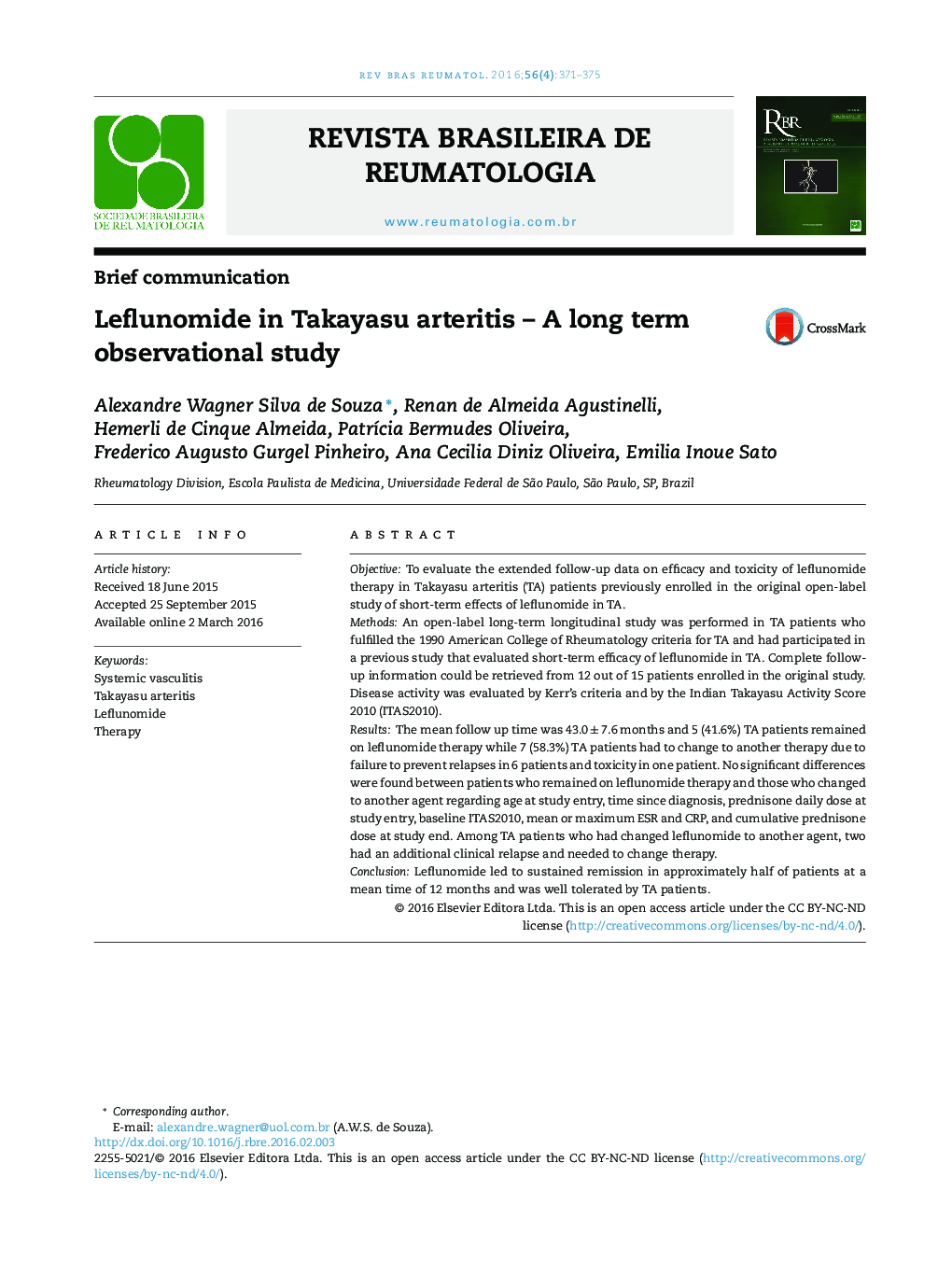| Article ID | Journal | Published Year | Pages | File Type |
|---|---|---|---|---|
| 3384986 | Revista Brasileira de Reumatologia (English Edition) | 2016 | 5 Pages |
ObjectiveTo evaluate the extended follow-up data on efficacy and toxicity of leflunomide therapy in Takayasu arteritis (TA) patients previously enrolled in the original open-label study of short-term effects of leflunomide in TA.MethodsAn open-label long-term longitudinal study was performed in TA patients who fulfilled the 1990 American College of Rheumatology criteria for TA and had participated in a previous study that evaluated short-term efficacy of leflunomide in TA. Complete follow-up information could be retrieved from 12 out of 15 patients enrolled in the original study. Disease activity was evaluated by Kerr's criteria and by the Indian Takayasu Activity Score 2010 (ITAS2010).ResultsThe mean follow up time was 43.0 ± 7.6 months and 5 (41.6%) TA patients remained on leflunomide therapy while 7 (58.3%) TA patients had to change to another therapy due to failure to prevent relapses in 6 patients and toxicity in one patient. No significant differences were found between patients who remained on leflunomide therapy and those who changed to another agent regarding age at study entry, time since diagnosis, prednisone daily dose at study entry, baseline ITAS2010, mean or maximum ESR and CRP, and cumulative prednisone dose at study end. Among TA patients who had changed leflunomide to another agent, two had an additional clinical relapse and needed to change therapy.ConclusionLeflunomide led to sustained remission in approximately half of patients at a mean time of 12 months and was well tolerated by TA patients.
ResumoObjetivoAvaliar os dados de seguimento em longo prazo em relação à eficácia e toxicidade do tratamento com leflunomida em pacientes com arterite de Takayasu (AT) previamente recrutados no estudo aberto original dos efeitos de curto prazo da leflunomida na AT.MétodosFez-se um estudo longitudinal aberto de longo prazo com pacientes que preencheram os critérios para AT da American College of Rheumatology de 1990 e que participaram de um estudo anterior que avaliou a eficácia em curto prazo da leflunomida na AT. Obtiveram-se informações completas de seguimento de 12 dos 15 pacientes incluídos no estudo original. A atividade da doença foi avaliada pelos critérios de Kerr e pelo Indian Takayasu Activity Score 2010 (ITAS2010).ResultadosO tempo médio de seguimento foi de 43,0 ± 7,6 meses. Cinco (41,6%) pacientes com AT permaneceram em tratamento com leflunomida, enquanto sete (58,3%) tiveram de mudar para outro tratamento em razão da falha em prevenir recidivas em seis pacientes e toxicidade em um paciente. Não foram encontradas diferenças significativas entre os pacientes que continuaram o tratamento com leflunomida e aqueles que mudaram para outro agente em relação à idade no início do estudo, tempo desde o diagnóstico, dose diária de prednisona no início do estudo, ITAS2010 inicial, valor médio ou máximo de VHS e PCR, e dose de prednisona cumulativa no fim do estudo. Entre os pacientes com AT que mudaram de leflunomida para outro agente, dois tiveram nova recidiva clínica e precisaram mudar de tratamento.ConclusãoA leflunomida levou à remissão sustentada em aproximadamente metade dos pacientes por um período médio de 12 meses e foi bem tolerada pelos pacientes com AT.
